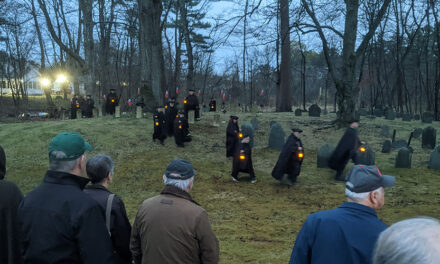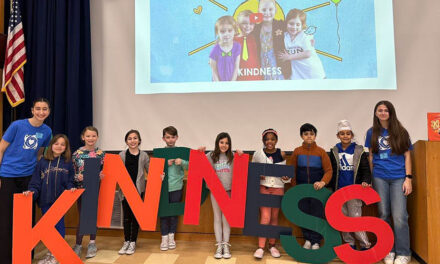Published in the March 9, 2016 edition
By MAUREEN DOHERTY
LYNNFIELD — The case for implementing full day tuition-free kindergarten for all Lynnfield students was made by Superintendent of Schools Jane Tremblay to the Board of Selectmen Monday night.
The plan, part of the school department’s proposed $22.8M operating budget for FY ’17, was first unveiled in January at a School Committee meeting and has been in the works by the district for several years.
Tremblay and the school’s administrative team believe it is imperative that the town implement free, compulsory full-day kindergarten in order to keep pace with the exponentially expanding academic mandates imposed upon all school districts for kindergarteners by the state Department of Elementary and Secondary Education (DESE). These mandates went into effect in 2011.
For example, as recently as 2001, the state’s frameworks for K students for English instruction required that students learn how to “print upper- and lower-case letters of the alphabet.”
By 2011, in addition to learning to print their letters, K students were expected to “demonstrate command of the conventions of standard English grammar when writing or speaking,” such as forming “regular plural nouns orally by adding ‘s’ or ‘es’; understand and use question words (who, what, where, why, when); and to “produce and expand complete sentences in shared language activities.”
In 2001, the state had set 15 frameworks in English/Language Arts (ELA) for K students, but they did not need to teach those standards “to mastery,” Tremblay said. Students were expected to be exposed to an additional 34 standards between pre-K and grade 2. “Children had three years to master it,” she said. Since 2011, each grade between K-2 has been prescribed its own standards. The result is that kindergarteners are now required to demonstrate mastery of 43 frameworks, with one additional skill to be mastered by grade 2, in ELA.
Tremblay said with mastery comes accountability and “increased assessment” of the students as well as “increased action plans for those students” who are not mastering the standards.
Math standards have also increased. For example, in 2000, K students were expected to “use objects and drawings to model and solve related addition and subtraction problems to 10.”
By 2011, just one of the new standards requires K students to “decompose numbers less than or equal to 10 into pairs in more than one way, e.g., by using objects or drawings, and record each decomposition by a drawing or equation (e.g., 5=2+3 and 5=4+1).”
In the current school year only 22 out of the district’s 175 kindergarteners are not enrolled in the full day kindergarten program. These 22 students attend school for 3 1/2 hours per day. Seven attend classes at Summer Street and 15 attend classes at Huckleberry Hill and all are integrated into the same classrooms as their full-day peers. There are a total of 153 students enrolled in the extended day program for which the district charges $2,600 in tuition per student, which amounted to revenue of $397,800 in the current fiscal year.
The full-day tuition-based kindergarten option was first offered in town in 2004 when Tremblay was an elementary school principal at the Summer Street School.
When district implemented the full-day tuition-based option, she said she could honestly tell parents “this was a personal choice,” therefore, whether parents opted to enroll their children in the partial day or full-day program “academically, they’ll be on a level playing ground…. When they go to first grade, the data will tell us that a 0.7 student has the same academic foundation as a full-day student,” Tremblay recalled.
That statement remained true until 2010, she said. Subsequently, the Department of Education ramped up the rigor of kindergarten, Tremblay said, therefore, since the 2011 DESE mandates, it has become increasingly difficult to optimize the academic instruction for all kindergarteners, not just those who attend for part of the day.
Tremblay assured the selectmen that the new required academic standards are being met in the morning hours when every kindergarten student in town attends classes. However, this means that those students who do not remain in school for the full day miss participating in art, music and other activities, as well as the additional benefit of free play time with their peers.
It also means that the school day may not be structured in the most beneficial way for all 175 kindergarten students, she said, because teachers do not have the luxury of breaking up the academic instruction with other beneficial activities, such as art and music, and they have less time to devote to the social-emotional needs of all students.
Loss of revenue
Tremblay stressed that offering free full day kindergarten represents a long-term investment in the education of all students in the district but she acknowledged that the loss of revenue “needs to be accounted for.”
Tremblay explained that the district would absorb the loss over time, making the program sustainable. For instance, in the summer of 2015, after the FY’16 school budget had already been set, five veteran teachers left the system and those positions were replaced with younger teachers whose salaries were not as high. Ordinarily, just one veteran teacher may leave in a given year, she said. The savings in salaries can be applied to offset the revenue loss, beginning with the current fiscal year.
The financial impact of offering tuition-free full day kindergarten (FDK) would be offset over five fiscal years from revenues in the full day kindergarten revolving account based on the following schedule: FY ’16: ($278,500), FY ’17 ($160,000), FY ’18 ($100,000), FY ’19 ($45,000 estimate) and FY ’20 (absorbed within the budget).
“The free tuition is more philosophical; it obviously is not a good financial move,” said Selectmen Chairman Phil Crawford. “By FY’20, you will be giving up about $278,000, based on today’s dollars, of a revenue stream we’ve been bringing in.” Crawford asked Tremblay out of the 22 part-time students, how many would be enrolled full-time if it was offered to them for free “because you don’t know the reasons for why they aren’t there,” he said.
“If this passes in the budget, we would offer only a full day kindergarten program,” Tremblay said. “The structure of that 0.7 program is not allowing us to offer a high-quality balanced program for all students because we have 22 students across the district, so our entire schedule is base on the 0.7 schedule.”
“I’m sure the struggle was to give up that income to serve the 22 students that aren’t participating at this point,” Crawford said.
Tremblay countered, “I would argue it is not just about those 22 students because the entire program is being impacted.”
She added, “We are given the responsibility to serve all kids, whether we’re leaving seven kids out or 20 kids out or 100 kids out, that deserves to have a conversation. Not only are some kids not having the opportunity to have that full-day, high-quality programming, but because of the rigors that are coming down that are thrust upon us from the outside, it is really compromising the entire program.”
Tremblay said Crawford’s suggestion of offering a scholarship program to the few who are not participating “becomes very complicated because not everyone is going to come forward and ask for that scholarship.” The $2,600 tuition has not been raised since 2004 to cover the cost of the additional 0.3 program, she added.
Selectman Tom Terranova asked where the funds from the bus fees go. Director of Finance Tom Geary said those funds go into the town’s general fund, but only amount to “about $5,000 to $8,000 per year.”
As of the 2014-15 academic year, Tremblay stated, out of the state’s 351 communities, 262 provided tuition-free FDK. In addition,16 communities charged $995 to $2,950; 33 communities charged $3,000 to $3,475; 35 communities charged $3,500 to $4,970; and five communities did not provide FDK information.
Budget overview
Offering tuition-free full-day kindergarten is just one aspect of the FY ’17 school budget.
FY ’17 is a union negotiation year. Tremblay said they are currently involved in negotiations with the unions so the budget she provided to them to review did not include specific line items for salaries, but she is confident the contracts will be settled prior to the April 25 Town Meeting.
The total proposed operating budget of $22,865,421 is a 4.5 percent increase ($984,634) over FY ’16.
The budget includes $2,484,981 in expenses, an increase of 8.2% over FY ’16 ($187,931) and anticipated salary expenses of $23,345,305, a 4.1 percent increase ($738,088).
The FY ’17 budget is offset by $480,000 stemming from $180,000 in activities fees, $140,000 from Community Schools and $160,000 in kindergarten tuition revenue to bring it to the $22.8M mark.
New salaried positions proposed are $41,496 for a part-time elementary music teacher at the Huckleberry Hill School; $57,824 in SPED salaries for a 0.6 preschool teacher and one full-time paraprofessional and an additional $50,000 to put toward a new administrative position called the Director of Teaching and Learning. The balance of that salary, approximately another $70,000, would be realized from savings in an anticipated retirement of an executive secretary.
The Director of Teaching and Learning would be utilized districtwide to support and mentor the teachers and administrators, a role historically assigned to school principals who in recent years have become increasingly bogged down fulfilling the state mandates placed upon school administrators, many of which are unfunded, that have taken the principals out of the classrooms.




